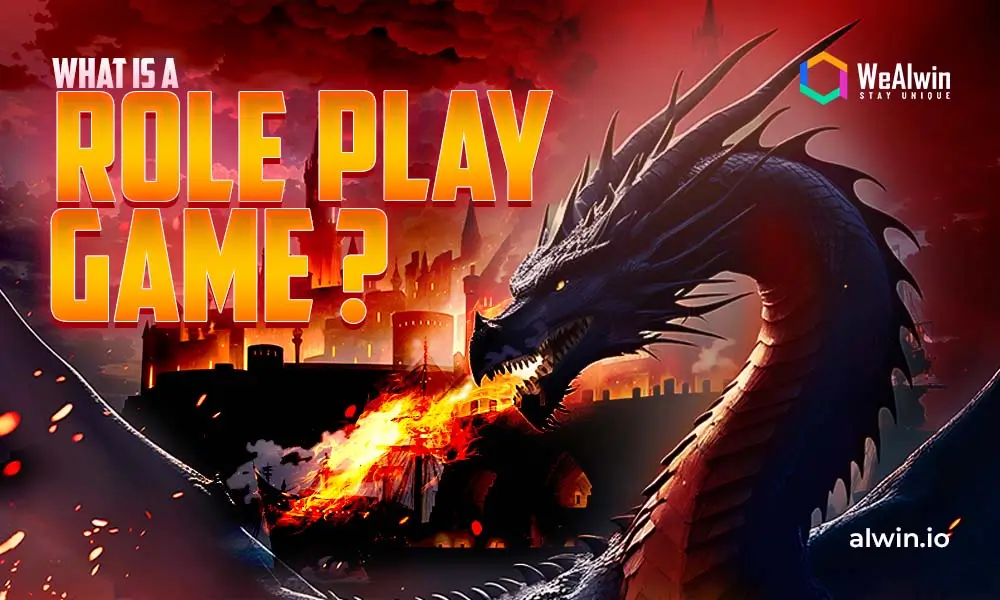Since their inception in the 1970s, role-playing games have come a long way. Tabletop games like Dungeons & Dragons introduced players to a new form of storytelling and gameplay. These games enabled participants to assume the role of fictional characters, traversing intricate fantasy realms, making judgments, and influencing outcomes based on their actions. What began as a niche hobby has since grown into a major force in the gaming industry.
Today, RPGs are available on a variety of platforms, including tabletop games, video games, and even online multiplayer environments. The RPG genre accounts for over 20% of the video game market worldwide. With an estimated 3.24 billion gamers worldwide by 2023, RPGs have established a large following. Popular titles like The Witcher, Final Fantasy, and Elder Scrolls have become household names, captivating millions with immersive worlds, rich narratives, and complex character development.
What Is a Role-Playing Game?
A role-playing game (RPG) is a type of game wherein players assume the roles of characters in a fictional world. These characters are frequently guided by specific traits, abilities, and skills. The game typically entails completing missions, resolving issues, and engaging with other characters or players. RPGs can occur in a variety of settings, ranging from fantasy realms packed with magical and mythological creatures to futuristic sci-fi universes.
In a role-playing game, players make decisions regarding their characters' actions, responses to certain events, and interactions with other characters. These decisions have a significant impact on the storyline and game progression. RPGs frequently emphasize narrative, character development, and exploration, providing a profound and immersive experience.
A Small Illustration
The Witcher 3: Wild Hunt is a popular RPG. In this game, players assume the role of Geralt of Rivia, a monster hunter who navigates a complex world full of political intrigue, danger, and mystery. As Geralt, players make decisions that have an impact on the outcome of the game, including the selection of quests to complete, the choice of allies, and the manner in which they approach combat situations. Every decision affects the story, which allows for multiple endings and unique gameplay experiences for each player.
Types of Role Play Games(RPGs)
Role-playing games come in a variety of styles, each offering a unique gameplay experience. The genre has evolved from traditional tabletop games to more complex video games with different mechanics and worlds. Here are some of the most popular types of RPGs,
Tabletop RPGs
Tabletop RPG games are the origin of role-playing games. These games, which are typically played with physical game boards, dice, and character sheets, are typically motivated by storytelling and imagination. One player, referred to as the Game Master (GM), narrates the world and events, while other players assume the roles of characters within the narrative.
Example: Dungeons & Dragons is an iconic tabletop RPG. Players create characters such as wizards, warriors, and rogues, and then embark on adventures through fantasy worlds, where they interact with creatures, solve puzzles, and battle enemies.
Action RPGs
Action RPGs combine elements of role-playing with action mechanics, focusing on real-time combat and fast-paced gameplay. Instead of a turn-based battle, players control their characters directly in combat, making quick decisions while engaging with their enemies.
For instance, The Legend of Zelda: Breath of the Wild is a popular action RPG where players control the protagonist, Players explore vast open landscapes, fight enemies in real-time, and solve puzzles, all while shaping the story through their choices.
Turn-based RPGs
In turn-based RPGs, players take turns acting, often following a strategic approach. During their turn, players usually select actions from the menus, such as attacking, defending, or using magic. This genre of role-playing games emphasizes the importance of strategy over reflexes.
For example: The Final Fantasy games are widely recognized as turn-based role-playing games. Players control a party of characters, each with their own unique abilities, and engage in combat that requires careful planning and decision-making.
Massively Multiplayer Online RPGs
MMORPGs elevate the RPG genre to an unprecedented level, enabling tens of thousands of players to exist and interact within a single game world. These games usually feature expansive virtual worlds, where players can team up with others to complete quests, battle enemies, and explore the environment.
For instance, World of Warcraft is a popular MMORPG. In this game players create characters, complete quests, and engage in extensive battles, all while engaging with other players from around the globe.
Tactical RPGs
Tactical role-playing games integrate traditional role-playing elements with strategy-based gameplay. Players must navigate maps, control their characters, and position them strategically in order to win battles. These games frequently feature grid-based movement and combat systems that require players to anticipate several moves ahead.
Example: Fire Emblem is a well-known tactical RPG where players control a group of warriors and strategically position them on battlefields in order to defeat enemies and complete missions.
Open-World RPGs
Open-world role-playing games afford players the liberty to explore vast, interactive environments at their own pace. These games frequently feature non-linear narratives, allowing players to select which quests to complete and how to handle diverse circumstances. The world feels dynamic, with characters and environments responding to player actions.
For instance, Skyrim is a renowned open-world role-playing game that offers players the opportunity to explore a vast fantasy world, complete quests, confront dragons, and make decisions that shape the narrative.
Sandbox RPGs
Sandbox RPG games emphasize player creativity and allow for open-ended gameplay. Typically, there is no predetermined narrative, allowing players to construct their own narratives within the game world. Sandbox RPGs frequently feature highly interactive environments where players can construct, craft, or modify their surroundings.
For example, Minecraft is a great example of a sandbox-based RPG. It is not a traditional role-playing game in every sense, but it allows players to build, explore, and interact with the world in creative ways.
Rogue-like RPGs
Rogue-like RPGs are characterized by procedurally generated environments and permadeath, meaning that if a character dies, the player must start over from the beginning. These games provide a challenging experience wherein no two playthroughs are identical, as the levels and challenges vary with each playthrough.
For instance, Hades is a rogue-like RPG where players control Zagreus, who battles through procedurally generated levels and uses various abilities to defeat enemies. If they die, they will restart their journey, but they will be able to retain some progress through upgrades.
Different types of RPGs provide different gameplay experiences, catering to a wide range of player preferences. There is a role-playing game for every type of gamer, whether you enjoy the creativity of tabletop games, the fast-paced action of real-time combat, or the strategic depth of turn-based or tactical RPGs.
Popular Examples of Role-Playing Games Transforming the Game Market
The genre of role-playing games has grown in popularity and endured for a long time. Character-driven gameplay allows players to dive into imaginative worlds and shape their stories through tabletop classics. The gaming industry has left a significant mark on some of the most popular and iconic RPGs.
Dungeons & Dragons (D&D)
Dungeons & Dragons is the origin of all modern role-playing games, and has been captivating players since its release in the 1970s. D&D lets players craft characters with distinctive talents and explore fabled realms governed by a dungeon master. The game's flexibility, rich lore, and emphasis on storytelling have made it a cultural phenomenon.
Why it’s popular: D&D paved the way for RPG mechanics in video games and is still widely played today with an active community of millions worldwide, both online and in-person.
Elden Ring
The punishing difficulty of Soulsborne games has been combined with a massive, open-world setting by Elden Ring, from the makers of Dark Souls. The game's focus on exploration, challenging combat, and lore-packed environments made it a commercial and critical hit in 2022, propelling creativity in the RPG genre.
Cyberpunk 2077
While Cyberpunk 2077 had a rocky launch, its ambitious world-building and deep narrative have slowly regained players trust after numerous updates. The futuristic setting lets players roam the sprawling Night City, where their choices impact the plot, delivering a lively mix of action and game-play elements. The game is seen as a transformative example of immersive world-building in RPGs, despite early criticisms.
-Over 18 million copies were sold, despite initial obstacles.
Final Fantasy XIV Online
The MMORPG landscape has been changed by Final Fantasy XIV. After a troubled release, the game was rebuilt from the ground up as Final Fantasy XIV: A Realm Reborn. Since then, it has become one of the most successful MMORPGs in the world. The game's blend of traditional RPG mechanics, stunning visuals, and a vibrant player community continues to draw millions of active users.
-More than 25 million registered users.
Persona 5
Persona 5 combines traditional turn-based RPG mechanics with life simulation in a unique blend. The game focuses on a group of high school students who moonlight as Phantom Thieves and fight in a mysterious realm while balancing their daily lives. It has earned widespread acclaim for its distinctive art style, engaging combat, and emotional storytelling.
The Legend of Zelda: Breath of the Wild
The open-world action-adventure RPG Breath of the Wild redefined exploration in video games, even though it's not a traditional RPG. Players take control of Link, traveling across the vast land of Hyrule to save Princess Zelda from the wrath of Ganon.
It's one of the most successful and critically acclaimed RPGs of all time, offering players unparalleled freedom to explore. With more than 30 million copies sold, it's one of the most successful and critically acclaimed RPGs of all time.
Divinity: Original Sin 2
A modern take on classic tabletop-style RPGs is Original Sin 2. A robust role-playing experience is provided by its turn-based combat, deep narrative, and cooperative multiplayer mode.
The game is often hailed as one of the best modern RPGs, with a dedicated fanbase that appreciates its deep mechanics and storytelling. Within its first year of release, the game sold over two million copies.
Genshin Impact
A high-quality, open-world experience with gacha mechanics was delivered by Genshin Impact. The game offers players a sprawling fantasy world rich in quests and exploration, with regular updates adding new characters and storylines. The game offers players regular updates adding new characters and storylines. Its global success has been due to its accessibility across multiple platforms.
-Over 50 million players around the globe contributed to its first year's earnings of $3 billion.
-Content updates and cross-platform play keep players engaged.
The gaming world has been impacted by these RPGs, not just because they're cutting-edge in terms of gameplay and narrative but also because they've got huge, committed players. They continue to influence the market and shape the future of gaming. The genre's ability to evolve and capture the imagination of players worldwide is demonstrated through rich narratives, expansive open worlds, or immersive role-playing experiences.
Summing Up
Role-playing games have come a long way since their inception, giving players deeper tales, more interesting characters, and engaging worlds to explore. From tabletop RPGs like Dungeons & Dragons to cutting-edge video games like Elden Ring and The Witcher 3, the genre constantly evolves to satisfy players' cravings for engrossing experiences.
As technology progresses, role-playing games are likely to become even more engaging and realistic. With the integration of virtual reality, artificial intelligence, and procedural storytelling, players will have even more control over the game world and their character’s actions. Every choice a player makes could have a lasting impact, and game worlds could change dynamically as a result of these innovations.
Furthermore, the rise of role-playing games will continue to connect players around the world, creating shared experiences that are not only fun but also social and collaborative. So this results as the perfect time to start your Role Playing Game Development through which you can maximize profit and succeed in entrepreneurship.



